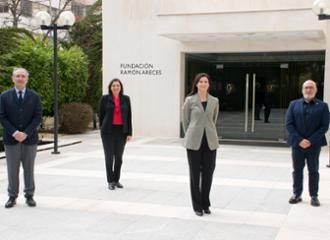Proyectos
Proyectos de investigación
Comienza el contenido principal
Clinical genetic studies of a cohort with hereditary Alzheimer's disease (new locus)
Marcadores genéticos y farmacogenéticos
Centro de investigación o Institución: Fundación para la Investigación Biomédica. Hospital Universitario Ramón y Cajal. Madrid.
Abstract
Alzheimer's disease is the most common neurodegenerative disease. Due to its frequency, made more serious by the progressive ageing of the population, it is one of the main Public Health problems in the Western world. The enormous development of Molecular Genetics in the previous and present decades has made Genetics one of the main techniques for studying the mechanisms that produce neurodegenerative diseases. This type of research is carried out using genomic markers of families that are large enough for clinical alterations to be found in some of their members. In the area of Alzheimer's disease, these studies have made it possible to discover the main genes involved in Mendelian hereditary forms of this disorder. These forms differ from the non-Mendelian forms of Alzheimer's disease mainly in the fact that dementia appears at younger ages, around 30-40. Through clinical and genetic studies, our group has detected a family with hereditary, late-onset Alzheimer's disease, similar to the common forms of Alzheimer's disease but caused by a different gene from those known up to now, which have been ruled out in the case of this family (Jiménez-Escrig: A multigenerational pedigree of late-onset Alzheimer's disease implies new genetic causes. Brain 2005 128(7):1707-1715). This project seeks to draw up the genetic map required to research the gene involved in the Alzheimer's disease suffered by this family. The methodology to be used will consist of completing the genomic map drawn up to date, analysing, with extremely densely spaced markers, the candidate regions detected in the study and sequencing the genes that are in these regions. The importance of detecting this gene, which will be the first gene detected in a late-onset Mendelian hereditary form, lies in the fact that the possible findings will, with all probability, be applicable to the population in general and, therefore, there are possible diagnostic applications or a possible use of this protein as a new therapeutic target for Alzheimer's disease.
-
 Actividades relacionadas
Actividades relacionadas
-
 Proyectos relacionados
Proyectos relacionados
-
 Noticias relacionadas
Noticias relacionadas
-
 Publicaciones relacionadas
Publicaciones relacionadas
 Actividades relacionadas
Actividades relacionadas
-
26
sep
2022
Conferencia Terapia génica y celular avanzada… Más allá de la última frontera Madrid, Lunes, 26 de septiembre de 2022, 19:00 horas
-
20
abr
2023
Jornada Mujeres científicas en el ámbito farmacéutico Madrid, Jueves, 20 de abril de 20223, 19:00 horas
-
9
may
2024
Conferencia Genes de mosca y genes humanos: una comparación Madrid, Jueves 09 de mayo de 2024, 19:00 horas
 Proyectos relacionados
Proyectos relacionados
- Estudio clinicogenético de una cohorte con enfermedad de Alzheimer hereditaria (nuevo locus) 2006 Investigador Principal: Adriano Jiménez Escrig Centro de investigación o Institución: Fundación para la Investigación Biomédica. Hospital Universitario Ramón y Cajal. Madrid.
- Biomarcadores metagenómicos de riesgo y tratamiento de la Sepsis Bacteriana en el marco de la Medicina de Precisión 2018 Investigador Principal: María Teresa Coque González
- Nanopartículas sintéticas como tratamiento innovador en la sepsis (SPRINT-4-SEPSIS) 2018 Investigador Principal: Antonio Artigas Raventós Centro de investigación o Institución: Instituto de Investigación e Innovación Parc Taulí (I3PT), Corporación Sanitaria i Universitaria Parc Taulí
 Noticias relacionadas
Noticias relacionadas
-

Eric D. Green: “La genómica debe integrarse en la medicina convencional”
Publicado el 12/03/2021
 Publicaciones relacionadas
Publicaciones relacionadas
Fin del contenido principal






